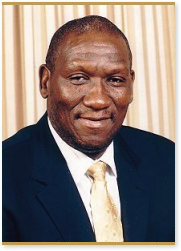
Minister Bheki Cele
MEC
Private Bag X9043 / 172 Burger Street
Pietermaritzburg
3200 / 3201
Telephone No.: (033) 355 8760
Fax No.: (033) 342 8824
Bheki.Cele@Kzntransport.gov.za
Sharon Gaehler
Personal Assistant
Telephone No.: (033) 355 8760
Fax No.: (033) 342 8824
Sharon.Gaehler@Kzntransport.gov.za
Standiwe Duze
Manager: Ministerial Support Services
Telephone No.: (033) 355 8760
Fax No.: (033) 3428824
Cell No.: 082 808 5248
Standiwe.Duze@Kzntransport.gov.za
|
Bhekokwakhe Hamilton Cele
Mr. B.H. Cele was born on April 22, 1952 to Albertina Mtshali and Gilford Cele at uMzumbe Mission near Port Shepstone. He grew up in uMzumbe and Lamontville. He completed his high schooling but could not proceed to tertiary level due to a lack of financial assistance for African people at the time by the company that his father worked for prior his death. It was the quest to change these inequalities and discrepencies that drove MEC Cele to join the African National Congress underground structures under the leadership of Mr. Jacob Zuma.
Through hard work and perseverance, Mr. Cele completed his teacher's diploma and taught at Mbumbulu schools. Together with the likes of Mathew Goniwe, Mr. Cele was instrumental in the founding of the National Education Union of South Africa, a predecessor of the South African Democratic Teachers Union.
With the banning of the African National Congress, Mr Cele found a home in the United Democratic Movement (UDF), and in Lamontville founded youth organizations aligned to the African National Congress. This was in the early 1980's, at the height of the township struggles led by the newly formed UDF.
In 1984, MEC Cele's activities caught the attention of the security police who then came for him. He fled from the police, travelled to Angola where he joined the ANC's military wing, UMkhonto weSizwe.
MEC Cele was infiltrated back into the country, but was captured by the security police in 1987 and was imprisoned on Robben Island, until his release in 1990. On his release, Mr. Cele continued his involvement with the ANC and was elected into various leadership positions. He was entrusted by the leadership to co-ordinate the organization's security and peace initiatives. In 1994, he was elected onto the organisation's Provincial Executive Committee in KwaZulu-Natal and as a member of the KwaZulu-Natal Legislature, where he served as the chairperson of the Safety and Security Portfolio Committee. He was subsequently appointed to a powerful position as the Chairperson of Chairpersons in the KwaZulu-Natal Legislature, a task he executed with great diligence and competence. He also served as a chairperson of the biggest region iTheku until 2008.
Present Portfolio
MEC Cele is currently a member of the National Executive Committee (NEC) of the ANC. He is a serving member of the KwaZulu-Natal Provincial Legislature and a Member of the KwaZulu-Natal Executive Council led by Premier J.S. Ndebele. His portfolios are Transport and Community Safety and Liaison.
Since his appointment as the MEC for Transport, Community Safety and Liaison, Mr. Cele has had a hectic schedule geared towards defending the weak in the Province of KwaZulu-Natal. This has seen him being thrown into the deep end of the taxi conflict, creating synergy between the two departments thus pioneering the initiative "Catching Crime on the Highway". He is renowned for championing rural development. Operation kuShunquthuli is his brain child, which is geared towards bringing road infrastructure development to previously neglected rural communities.
For Mr. Cele, the ideal situation with regards to safety and security would be "when a young lady, walks home alone from a night club without fear of criminals because it is safe to do so". For Mr. Cele, the ideal situation for Public Transport would be "when everybody leaves their cars at home and opts to use public transport because it is safe, affordable, efficient and reliable". For Mr. Cele the ideal for road infrastructure development is “when communities are no longer eaten by crocodiles when crossing the rivers to access schools, clinics, hospitals, agricultural land for roads and bridges would have been built for all communities to use”.
|